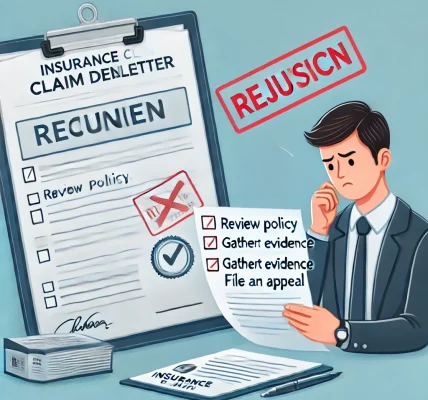Filing an insurance claim can be a daunting process, and delays can cause significant frustration, especially when you need financial support urgently. However, by understanding the process and avoiding common pitfalls, you can expedite your claim and ensure a smooth payout.
This guide will walk you through expert tips to speed up your insurance claim process, making it hassle-free and efficient.
Understanding the Insurance Claim Process
Before diving into the tips, it’s essential to understand the typical steps involved in filing an insurance claim:
- Report the Incident – Notify your insurer as soon as possible.
- Gather Necessary Documentation – Collect all required documents, including policy details, accident reports, medical records, and proof of loss.
- Inspection and Assessment – An insurance adjuster will evaluate the claim.
- Approval or Rejection – The insurer will review the claim and decide whether to approve or deny it.
- Payout Processing – If approved, the insurer will process the payment or reimbursement.
Each step takes time, but by following these expert tips, you can speed up the process significantly.
Expert Tips to Speed Up Your Insurance Claim
1. Report the Claim Immediately
One of the most effective ways to expedite your insurance claim is to report it as soon as the incident occurs. Most insurers have specific timeframes within which you must file a claim, and delays can result in additional scrutiny or even rejection.
How to do it:
- Call your insurer’s helpline or use their mobile app to initiate the claim.
- Provide basic details about the incident.
- Request a checklist of required documents to avoid back-and-forth delays.
2. Ensure Accurate and Complete Documentation
Incomplete documentation is a common reason for claim delays. To avoid unnecessary delays, gather all required documents before submitting your claim.
Documents You May Need:
- Insurance policy details
- Incident report (police report, medical report, fire department report, etc.)
- Photographic or video evidence
- Bills and receipts for expenses incurred
- Bank details for direct deposit payments
3. Provide Clear and Consistent Information
Inconsistencies in your claim can raise red flags and lead to further investigation, delaying your payout. Always ensure the information you provide is accurate and consistent across all documents.
How to do it:
- Double-check all details before submission.
- Ensure that dates, locations, and descriptions match across all paperwork.
- Avoid exaggeration or misrepresentation.
4. Follow Up Regularly with the Insurer
Once you’ve submitted your claim, don’t assume the process will move forward on its own. Regular follow-ups can help keep your claim on track and address any potential roadblocks early.
Best practices for follow-ups:
- Keep a record of all communications with the insurance company.
- Follow up every few days if there’s no response.
- Escalate the issue to a supervisor if you experience delays.
5. Work with an Insurance Adjuster Effectively
Insurance adjusters play a crucial role in determining the outcome of your claim. Cooperating with them and providing all necessary information promptly can speed up the process.
How to work with adjusters:
- Be honest and transparent about the incident.
- Provide all requested documents promptly.
- Be available for calls, meetings, and inspections as needed.
6. Opt for Cashless Settlement When Possible
If your insurance policy offers a cashless claim option, use it. Cashless settlements often have a faster processing time as the insurer directly pays the service provider (hospital, repair center, etc.).
Benefits of cashless claims:
- Eliminates the need for reimbursement processing.
- Reduces paperwork and documentation requirements.
- Ensures quicker approval and payment.
7. Use Technology for Faster Processing
Many insurance companies now offer online portals and mobile apps to file claims, track progress, and upload documents. Using these digital tools can significantly speed up the claim process.
How to leverage technology:
- Use the insurer’s mobile app to submit and track claims.
- Upload documents online rather than mailing them.
- Opt for electronic fund transfer (EFT) for quick payout.
8. Know Your Policy Inside Out
Understanding your policy’s terms and conditions can help you file the claim correctly and avoid unnecessary delays. Being aware of what is covered and what is not can save time and effort.
Key things to check in your policy:
- Coverage details and exclusions
- Claim submission deadlines
- Required documentation
- Claim limits and deductibles
9. Seek Professional Assistance if Needed
If you encounter delays or disputes with your insurer, consider consulting a professional, such as an insurance advisor or lawyer. They can help you navigate the claims process and ensure you receive a fair payout.
When to seek help:
- If your claim is taking too long without valid reasons.
- If your claim is denied despite proper documentation.
- If you are unsure about legal or policy-related aspects.
Common Reasons for Claim Delays
Even with the best practices, claims can still get delayed due to various reasons. Here are some common ones to be aware of:
- Incomplete documentation – Missing key documents can halt the process.
- Delays in insurer’s processing – Some insurers take longer due to high claim volumes.
- Investigation for potential fraud – If the insurer suspects fraud, they may conduct a detailed review.
- Errors in claim submission – Incorrect information can lead to back-and-forth communication.
- Non-disclosure of pre-existing conditions or prior claims – Any discrepancies can slow down the process.
Final Thoughts
Filing an insurance claim doesn’t have to be a slow and frustrating process. By taking proactive steps, staying organized, and maintaining clear communication with your insurer, you can significantly speed up your claim settlement. Always read your policy carefully, provide accurate details, and follow up consistently to ensure a smooth and timely payout.
By following these expert tips, you’ll be well-equipped to handle any insurance claim efficiently, reducing stress and getting the financial support you need without unnecessary delays.



